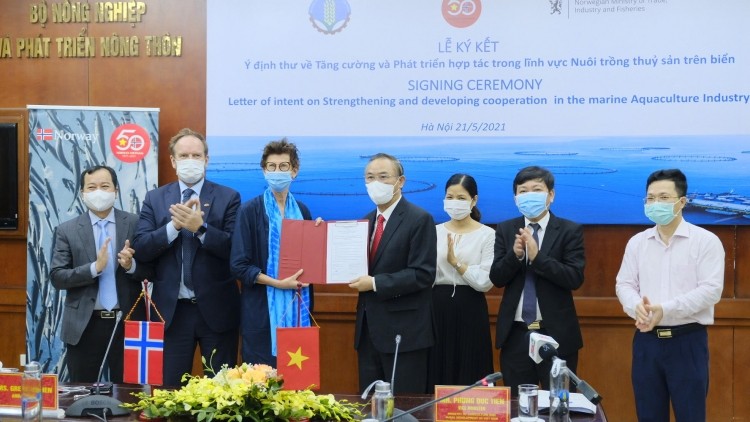
Norway-Viet Nam: Strengthening cooperation for green growth & sustainable development strategies
Latest
 |
| Norwegian State Secretary Bjørg Sandkjær shared about the potential for cooperation between Norway and Viet Nam. (Photo: PH) |
Norway and Viet Nam are co-chairing an International Conference on Sustainable Ocean Economy and Climate Change Adaptation. Could you share with us the purpose of your visit to Viet Nam this time? Why Viet Nam?
The main purpose of my visit this time is to participate in the International Conference on Sustainable Ocean Economy and Climate Adaptation in Ha Noi. Viet Nam and Norway will co-chair this event, with the support of the United Nations Development Program (UNDP). The conference will bring together more than 400 domestic and international delegates to discuss opportunities to promote sustainable use of ocean resources and key challenges posed by the climate change and environmental pollution.
In addition to attending the conference, I will also have bilateral meetings with various Vietnamese partners, including MOFA on multilateral issues as well as the UN and other international partners in Viet Nam. I am really looking forward to the visit and to further enhancing the bilateral relations between our two governments.
Norway and Viet Nam share the same objective of combating climate change and making healthy and productive oceans a global priority. Just like we are seeing real and concrete consequences of climate change in the Arctic, ASEAN countries, and in particular Viet Nam, are experiencing climate-induced impacts in terms of sea level rise and an increased number of extreme weather events.
Just like Norway, Viet Nam is an ocean state with vital interests in the ocean economy. Our two countries are acutely aware of the need to ensure a clean and healthy ocean if we are to be able to harvest sustainably from the oceans also in the years to come. That is the backdrop to our two countries hosting this conference.
These kinds of conferences are important in order to mobilize awareness and actions to deal with the most important global challenges of our time. I am convinced that we as the international community together can push the ocean, climate, and environmental agenda forward in 2022.
Norway and Viet Nam celebrated 50 years of bilateral relations in 2021. How do you evaluate the cooperation between the two countries in general and particularly in the areas of ocean economy and climate change adaptation?
On 25 November 1971, Norway was among the first Western countries to establish diplomatic ties with Viet Nam. Norway and Viet Nam have enjoyed a good and solid friendship and cooperation for the last 50 years.
The traditional relationship based on development assistance has now evolved to equal partnership, bilaterally and multilaterally with a focus on trade and business; likewise, how we can address global challenges such as climate change and marine littering together.
As countries with long coastlines, we are both among the world’s largest seafood exporters. We take pride in the long bilateral cooperation in the fisheries sector, spanning from governance, to research, academic and vocational training, and business promotion.
Norway has strong expertise and experience in sustainable ocean economy, renewable energy and circular economy solutions. Norwegian companies are eager to invest in Viet Nam and develop in areas such as offshore wind, waste management (plastic) and marine aquaculture.
| Like Viet Nam, Norway strongly supports a multilateral system with a strong and efficient UN at its core and a well-functioning international order. I am very pleased to see we are establishing closer dialogue and cooperation on several multilateral issues. |
Like Viet Nam, Norway strongly supports a multilateral system with a strong and efficient UN at its core and a well-functioning international order. I am very pleased to see we are establishing closer dialogue and cooperation on several multilateral issues.
Norway and Viet Nam shared many of the same priorities in the UN Security Council (UNSC) when we were together in the Council last year, such as women, peace and security, protection of civilians, as well as climate change and security. Norway is a sectoral dialogue partner of ASEAN, and this provides another track of cooperation for us to work closely together on matters of mutual interest.
Cross-cutting topics such as enhancing the role of women, gender equality and inclusion of ethnic minorities and other vulnerable groups remain high on our mutual agenda. This is more important than ever as the pandemic has negatively affected women and other vulnerable groups the most. Leave-no-one-behind and international solidarity is particularly crucial if we want to succeed in reaching the sustainable development goals (SDGs) by 2030.
 |
| The signing ceremony of the letter of intention on Strengthening and developing cooperation in the marine Aquaculture Industry. (Source: vov.vn) |
Both Norway and Viet Nam share the view that there is a need to maintain the rules-based international order. We are ready to continue our dialogue and cooperation on issues of mutual concern, stand up for global values, and work constructively together for sustainable and greener development, leaving no one behind!
Furthermore, Norway and Viet Nam share the same objective of combating climate change and promoting healthy and productive oceans. We have both announced increased climate commitments. Now we need to focus on implementation and building partnerships that can deliver. For Norway, climate change is a key priority in our development cooperation.
The most recent reports of the Inter-Governmental Panel on Climate Change (IPCC) have clearly shown that urgent action is required to adapt to climate change. Action on adaptation has increased but progress is uneven, and we are not adapting fast enough.
Norway is committed to at least tripling our support for adaptation as part of our pledge to triple climate finance by 2026. We are actively supporting adaptation programs and efforts mainly through multilateral channels. For us, the Green Climate Fund (GCF) is a key partner, and I am encouraged to see that Viet Nam has received funds for adaptation from the GCF.
The support will empower vulnerable smallholder farmers in the central highlands and south-central coast to manage increasing climate risks to agricultural production by securing water provision, supporting farmers to adopt climate-resilient agriculture, and strengthening access to agro-climate information, credit and markets.
Viet Nam is vulnerable to the adverse impacts of climate change. Of particular concern is sea level rise, an issue that Viet Nam has put on the international agenda. I would like to commend Viet Nam’s leadership on this issue.
In your capacity, how do you see the future of this cooperation and what Norway can help Viet Nam in our green transition efforts to address climate change implications?
Both Norway and Viet Nam have set high ambitions for the green transition. We need to take immediate action to achieve the Paris targets. And without global cooperation we cannot solve common problems.
Now all countries must take concerted and immediate action to deliver on their commitments. This means phasing down coal power, ramping up investment in renewable energy, halting deforestation, speeding up the switch to electric vehicles and reducing methane emissions.
| Both Norway and Viet Nam have set high ambitions for the green transition. We need to take immediate action to achieve the Paris targets. And without global cooperation we cannot solve common problems. |
A key issue to achieve our climate objectives is to transform the way we produce and use energy. The objectives of the green transition are shared across the world. Different countries may, however, have somewhat different points of departure, with significant variations in energy mix, potentials, skills and resources. There is no one-size fits all.
Norway will do its share. We will reduce our emissions by 50-55% by 2030. And reduce emissions by 90-95% by 2050. As a sizeable petroleum producer, we are also ploughing significant resources into green technologies, such as electric mobility, carbon capture and storage, green shipping, hydrogen, offshore wind and batteries.
We need to cooperate with business, industry and social partners to forge a just transition towards a renewable, circular and sustainable future. In doing so, we will need to focus on creating jobs, increasing exports and facilitate new and existing industries based on our common natural resources.
Norway will double its climate finance to 14 billion Norwegian kroner (Approx. 1.5 billion USD) by 2026. As part of this, we will at a minimum triple our adaptation finance. We will work with Viet Nam and other countries to help finance the transition to renewable energy.
A key issue will be to support investments in renewable energy that can help phase out coal. To that effect, Norway has established a Climate Investment Fund to finance renewable energy in Viet Nam and other countries. And we will continue our efforts to preserve tropical forests.
The path to carbon neutrality offers great opportunities for innovation, growth and sustainable jobs for all countries. Norwegian companies know this. They bet on the opportunities offered by clean technologies at an early stage. And their pioneering spirit is now paying off.
I am particularly pleased to note the increasing interest in developing partnerships with Vietnamese companies. I hope that we will strengthen our cooperation on moving sustainable development forward – not only in the interests of a clean environment but also for our prosperity.












